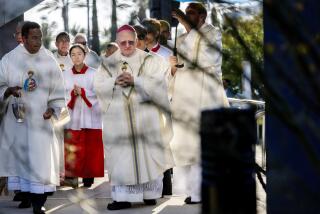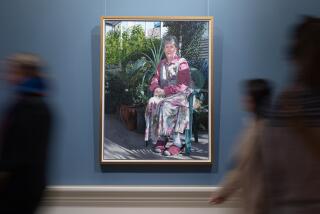A Female Priest’s Unusual Route to Parenthood
- Share via
WASHINGTON — Lesley Northrup wanted a baby.
Like many women of her generation, Northrup, now 40, had focused all her energies first on education and professional training, then on establishing herself in her career. But the deep urge to create and nurture new life would not be denied.
She had no plans to marry, and an adoption was beyond her budget. So, on three successive nights in December, 1985, she inseminated herself with sperm from three different, carefully chosen donors. Fifteen-month-old Evan Arandes Northrup, her soft brown hair framing a face that seems a small clone of her mother’s, is the result.
Single women opting to have babies by artificial insemination, while far from commonplace, have gained increasing acceptance in today’s changing sexual mores.
But Lesley Northrup is a priest of the Episcopal Church, bound by ordination vows to live her life as “a wholesome example” of Christian precepts. Northrup, an intense, articulate woman, believes that there is nothing in her route to parenthood to strain those vows.
And so far, leaders of her church agree. They say that her actions, although unusual, have not violated any biblical commandment or prevented her from serving as a priest.
No Sexual Act
“I have done nothing illegal or immoral in having this child,” Northrup said. “I cannot think what the offense might be. Adultery? None of the parties was married. Extramarital sex? No sexual act occurred.”
Masturbation, required to produce semen for her child’s conception, is not prohibited by the Episcopal Church. It “is biblically condemned specifically because it does not lead to conception, quite the opposite of what happened here,” Northrop argued.
Nor is the bitterly controversial issue of surrogate motherhood involved. “No one can claim that this baby was purchased. The donors were all unpaid volunteers; the pregnancy, mine,” she said.
Nevertheless, Northrup, who says she believes that she is the first priest to be artificially inseminated, was aware that her action might have an emotional impact in a church still troubled by controversy over its decision a decade ago to ordain women.
“I didn’t enter into it without consulting extensively,” she said. “I would not have done this unless I could have satisfied myself from the church’s point of view that no wrong has been done.”
She is so confident of her decision that she plans to repeat the process. Next month, Northrup said, she hopes to conceive a brother or sister for Evan by artificial insemination.
Once she had decided to bear her first child, Northrup said, “the hardest part of the process was getting (sperm) donors.”
A prime criterion for a potential sperm donor, along with health considerations, was a willingness to forgo any claim to paternal rights. Northrup had to find “someone who could do this without needing to be involved with the baby’s upbringing,” she said.
“They had to be people I knew well enough to trust and to trust me, but not close enough that they’d be daily watching the baby grow up and develop an attachment.”
Discussions with prospective donors were always in the context of “donating a necessary element for something,” she explained, “not of creating a baby, not as potential fathers. . . . They were donating something rather than creating something.”
No Clue as to Father
The three donors she settled on, two of them priests, were unknown to each other. All were unmarried. Because Evan closely resembles her mother, there is no clue as to which is her father. Northrup says she refuses to speculate on who the father is, and she says she has no intention of having gene or blood tests performed to establish paternity.
All three donors have kept the “gentlemen’s agreement” not to get involved in the life of the child, she said. “I sent them birth announcements and they each sent a christening gift.”
But there have been no contacts with the child since then--”no birthday gifts, nothing like that at all. They don’t feel a connection with the child. . . . They were donors, not potential fathers.”
Northrup believes that her daughter, a cheerful toddler who is “into everything,” will not suffer from her unusual origins or from growing up in a single-parent home.
“She’s not going to go through life with people asking her how she was conceived,” Northrup said. People usually do not raise such questions. With massive numbers of single-parent families throughout the country today, Northrup added, Evan’s upbringing will not be different from that of many of her peers.
She is being provided with warmth and emotional nourishment from Northrup’s family and friends, plus a day-care arrangement with a next-door neighbor who is “like one of the family,” Northrup said. “I am quite sure the child gets loved to the edge of being spoiled as much as other children.”
Northrup’s family--her parents from Upstate New York, her two sisters and her brother--became “very supportive” once they understood what she was doing, Northrup said. “They are delighted.”
“It’s a terrible thing to talk about an ‘illegitimate’ child--and we don’t anymore.” But for people of her parents’ generation, Northrup said, that was an issue that had to be laid to rest.
“Once those folks have stopped to think about what I’ve done, and realized that none of those types of behaviors were involved here, my family has come to realize I’d done nothing here to embarrass them,” she added. “They were very happy to become grandparents. . . . They had given up on me.”
Northrup and her daughter live in a two-story frame house--”the first house I’ve ever owned”--in a Northeast neighborhood on a tree-lined street of single-family homes with strollers and tricycles on front porches.
A Call to Teach
Northrup, who teaches writing at the University of Maryland and liturgics at Virginia Theological Seminary in Alexandria, does not serve as a full-time priest at any parish. “I feel my calling is more to teaching,” she said. But she does “quite a bit of supply work”--filling in at parishes around the diocese that are between rectors.
The parishes “have been extremely supportive,” she said.
She has the unqualified backing of Bishop Paul Moore of New York, who ordained her in 1981. Northrup remains under his ecclesiastical supervision because she is not a full-time parish priest here.
“As her bishop I can affirm that which Lesley has done,” said Moore, one of the most liberal leaders of the Episcopal Church.
“I have no intention of disciplining her, criticizing her or condemning her,” he said. While her route to parenthood is “unusual . . . I don’t see that she has in any way broken any of the commandments.”
In accordance with church law governing priests from other dioceses, she is licensed to function as a priest in the Washington diocese--”which generally means the bishop (John T. Walker) approves of her for use in parishes,” said Canon John Frizzell Jr., executive officer of the diocese.
Northrup said she heard “some rumblings from church institutions” after publication this fall of an article she wrote about Evan in The Witness, a small church journal.
“I am not a radical feminist, you know, but it’s interesting. . . . They were all men who complained that they had been taken out of the process. The fact that one can start a family, build family life, without a male being in it seems to be threatening.”
In “going public” with her decision, Northrup said, “I was trying to stimulate some debate. I think it is time to examine all the assumptions about the family” that are taken for granted today. “I feel that what I have done is to deliberately create a loving family unit.”
Northrup does not rule out a more conventional family unit sometime in her future. “Well,” she said when asked about the possibility of marriage, “I am 40 years old. But--one never knows what might happen.”
She recognizes, too, that there may come a time when Evan demands to know who her father is. Those are issues “I’m prepared to deal with if they come up,” she said. “My feeling is that a parent is the person that raises you and loves you.”
More to Read
Sign up for Essential California
The most important California stories and recommendations in your inbox every morning.
You may occasionally receive promotional content from the Los Angeles Times.













